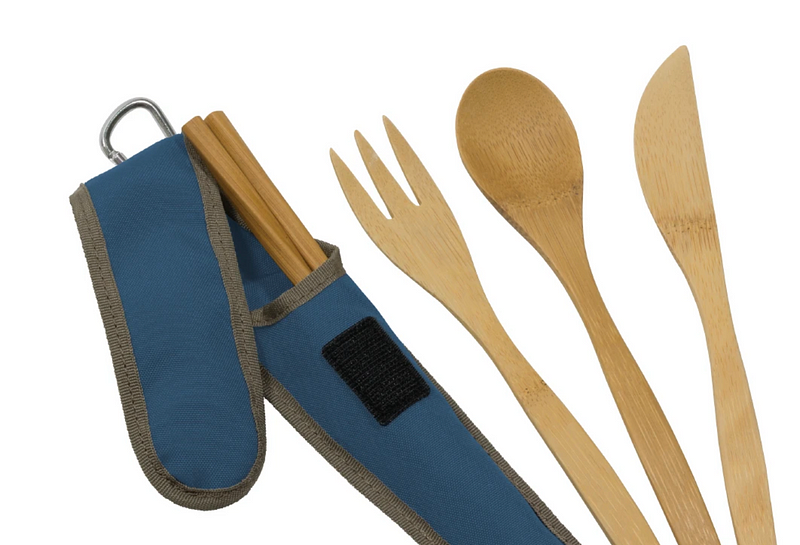
As part of their work to reduce waste on campus, the Hamilton Sustainability Coordinators have begun offering free bamboo reusable utensils (like the ones pictured above) to students. Image courtesy of the HSC
In the wake of the pandemic, Hamilton College has begun using plastic utensils, individually packaged food items, and many other one-use items in the dining halls to prevent the possible spread of germs. Hamilton Sustainability Coordinators have thus initiated many projects aimed at addressing this increasing augmentation of waste.
Coordinator Asha Grossberndt ’21 said, “Although it is frustrating to see all the waste being generated on campus, there are ways in which we, as students, can be conscious of our waste and where it is going. We have a unique moment on campus where we are being forced to come face to face with our waste production.”
Pandemic restrictions have prevented clubs and organizations from hanging up informational posters. To virtually reach out to students, the Coordinators have created instructive emails and Instagram posts.
“We are coming out with a waste sorting video that we hope to have up on our Instagram this week, followed by a mini series focused on waste sorting,” said Coordinator Hannah Katz ’21.
In a recent email, HSC asked students to complete a questionnaire about recycling in exchange for a set of free bamboo, reusable utensils.
“The utensils will hopefully encourage people to bring their own utensils to the dining halls instead of using the single use utensils given out in the halls,” said Coordinator Jay Carhart ’21. “This should hopefully cut down on the amount of utensils we send to the landfill since they’re not recyclable.”
The questionnaire tested students’ understanding of where single-use items should be discarded. Coordinator Lilia Harlan ’22 described her plan to analyze students’ answers as a means to promote an environmental agenda.
Harlan said, “In our utensil survey, we asked questions about waste sorting and I’m planning on turning those questions into a graphic and posting it on Instagram with the real answers so people can again see what they are doing/ thinking vs. how it actually works.”
Katz agreed, emphasizing that students use close to 5,000 sets of plastic utensils everyday.
“With funding from the HSC and Dean of Students office, and support from SA, we were able to order 500 sets of utensils,” said Katz. “Since these students are now able to use reusable utensils and not plastic ones, we estimate we are keeping 1,500 sets of plastic utensils, every day!”
To reduce food waste, the Coordinators have dedicated many of their initiatives this semester to composting.
Carhart said, “We’ve had a ton of cross contamination which leads us to throwing everything in the landfill. If everyone knows how to compost correctly, we can start cutting down on waste real quick.”
The Coordinators have placed industrial composting bins outside at every tent and in some Milbank and Babbitt suites.
“We’ve done stationing at the bins to tell people how to compost,” said Carhart. “The composting bins [in suites] are something we did last year and we’re excited to do it again this year! It means we’re reaching more people to compost food instead of throwing suite food in the trash.”
According to the Coordinators, 24 suites have signed up to participate in the program.
Katz said, “The bins in the suites are actually contributing to our
Food2Energy
program run by OHSWA which puts food scraps through an anaerobic digester that creates methane gas, which is captured and used to run the water treatment plant.”
Each suite has received a compost bucket and compostable bags, which they must use themselves to collect and compost waste in their suites. Each suite is responsible for removing the bag of waste between 2:30 and 3:30pm on Fridays.
“With the temperatures dropping, personally, I am eating more and more in my room because it is too cold to eat outside,” said Grossberndt. “The goal of the compost bins is to provide suites with the ability to collect their compostable waste from the dining halls and their kitchens more easily and effectively than carrying out individual items.”
In addition to reducing waste on campus, Hamilton students can also vote for local and national candidates who will promote an environmental agenda.
“Students can get involved in clubs like HEAG or Sunrise for more activist action. They can also vote for candidates who focus on sustainability,” said Katz.
Harlan agreed.
“It’s important to know what’s happening around the world and in our country (wildfires, hurricanes, etc). Climate change is making things so much worse!,” said Harlan. “Even if we can’t always directly combat those things from upstate New York, we should still have an awareness of the world around us and keep that in our mind as we make decisions.”
While individuals’ actions can make a difference, the Coordinators emphasized that the Hamilton community can work together to make a larger environmental difference.
“This [waste reduction effort] is an important step in realizing the importance of our collective actions,” said Grossberndt. “The waste will not get better unless everyone is making an effort to properly sort their waste. I would encourage students to take a look at the bin labels and keep their eyes out for more information from HSC on waste and waste management on campus.”
HSC plans to conduct an Instagram live to make themselves available to the Hamilton community for questions and information. The Coordinators encourage students to reach out to HSC via email or social media to learn more about these initiatives and the ways in which they can help preserve the environment.